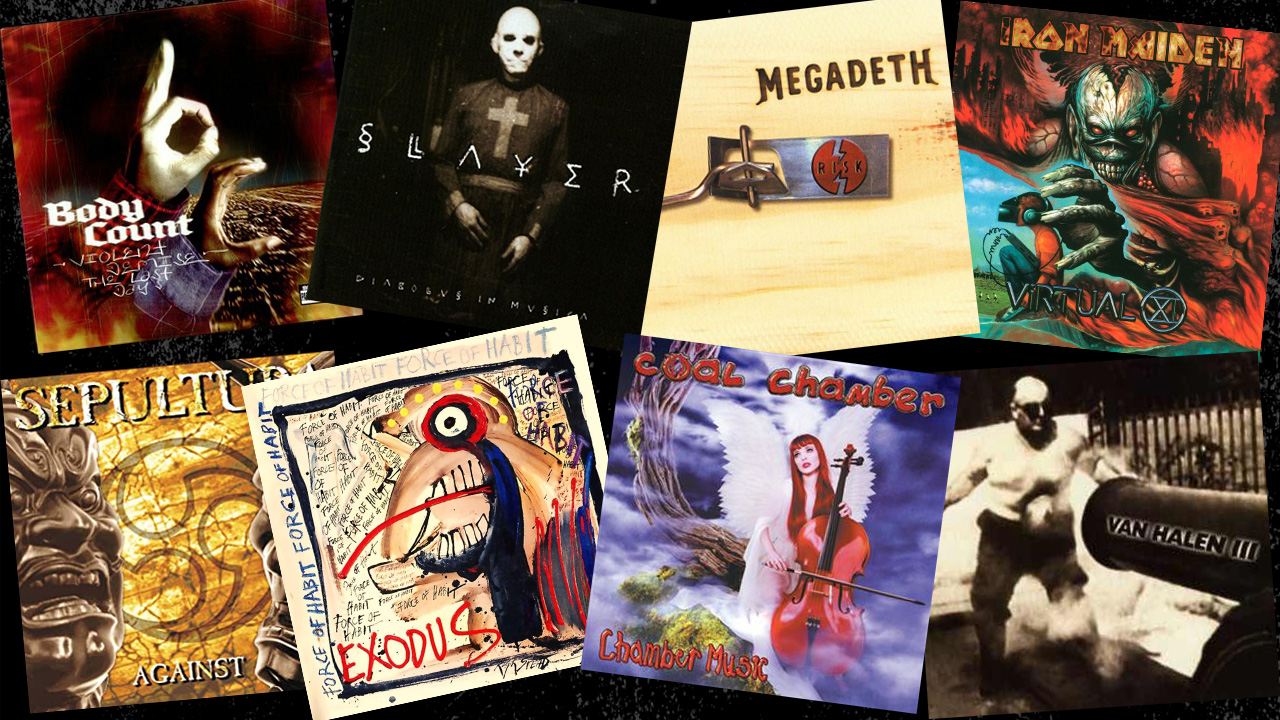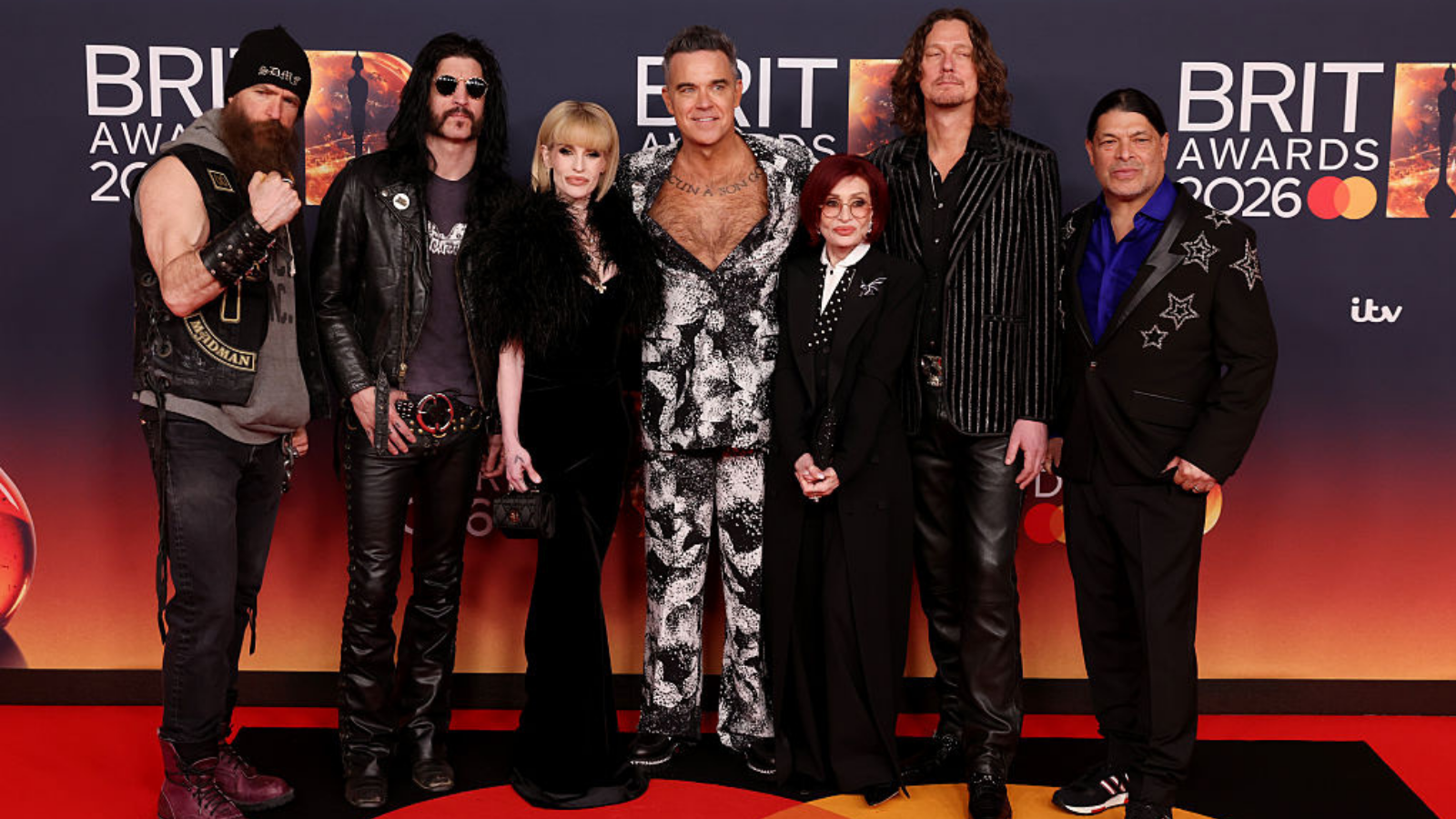The 10 worst albums of the 90s by 10 brilliant bands
The 90s was a divisive time for metal, and even the best bands back then made a few stinkers

Select the newsletters you’d like to receive. Then, add your email to sign up.
You are now subscribed
Your newsletter sign-up was successful
Want to add more newsletters?
The party line to toe is that the 1990s was a tough time for metal. But... really? Was it, though? The rise of Fear Factory, Machine Head, Korn, grunge, black metal, death metal’s dalliance with the mainstream, the Peaceville three, Swedish melodeath... that all sounds pretty good to us, and it’s just the tip of the iceberg.
Basically, when people are talking about the death of metal in the 1990s, they tend to mean the confusing, ill-advised and often just frankly appalling cack put out by many of the genre's biggest established names during that period. There’s no doubt that the decade was not so kind to the thrash and hard rock bands of the 80s.
There are a few of the 90s big boys here as well, and there are some omissions from the decade that might seem obvious to some readers. Like Machine Head’s divisive The Burning Red, that isn’t included here due to 2001’s atrocious Supercharger being even worse. Ditto the criminally underrated Load series by Metallica, which are very good records and a quantum leap away from St. Anger. Carcass’ Swansong is actually great (yes it is), so that’s never getting in. Same for Judas Priest’s Jugulator and Ministry’s Filth Pig, which are both far better records than you remember. And Motley Crue’s risible Generation Swine, is left out because... well... are Motley Crue a “brilliant” band? No, obviously not.
They all just made it out unscathed, but here are 10 albums we just cannot defend.

Exodus – Force of Habit (1992)
So, in the 90s Metallica sold out and made a hard rock album, and all the other thrash bands stayed true, right? Sorry, but we’re calling bullshit. There are a few examples of this idea being nonsense on our list, but none stinkier than Exodus’ fifth album from 1992. Most of Force Of Habit is pretty unmemorable groove metal that attempts to mix itself with the darkness of Alice In Chains, which is not what we want from Exodus. But really this album is on this list thanks to one song: the truly woeful Rolling Stone cover Bitch. A song where the Bay Area’s most notorious metal band enlist a brass section (lads, what were you thinking?) then proceed to try and impersonate the good-time funk metal of Extreme. It’s a ludicrous idea that’s appallingly executed, it pretty much represents the absolute nadir of thrash metal, and might be the single worst song on this entire list. And you got annoyed about Nothing Else Matters? Give your head a wobble.
Danzig – Blackacidevil (1996)
Glenn Danzig: the evil Elvis and a man who released some sublime and essential goth-laden alternative metal in the early part of the 90s. But by 1996, Danzig was looking a little old hat. He decided to combat this by looking at the success of White Zombie, Ministry and Nine Inch Nails, and jump onto the industrial metal bandwagon. A bandwagon with a set of wheels that were rapidly in the process of failing during the second half of the 90s. If industrial metal needed saving, Blackacidevil was certainly not the album to do it. Sounding dated pretty much before it was even made, the sound of Glenn binning off his smoky croon to belch all over the Republica B-side electronics of a song like Sacrifice was eye watering enough to smear his entire fanbases’ mascara. Glenn soon realised and retreated back to his Roy Orbison records, with his leather trousers between his legs.
Body Count – Violent Demise: Last Days (1997)
It was a different time, guys! Ice-T and Body Count have always gone out of their way to be as provocative as possible, and are still doing it to this day. And that's fine. But there are certainly some moments in their career that aren’t as challenging and necessary as Cop Killer, and are, in fact, just grotty and ill advised – and most of them happen to be on Violent Demise. Like the lyrics of Strippers, for example. But it’s the jaw-droppingly offensive I Used To Love Her, where Ice puts himself in the shoes of OJ Simpson as he murders his ex-wife – a crime he was famously acquitted of – that really does it. It’s a hot potato he’s handling, and it certainly burnt our hands. Ultimately this was just a very bad idea – quite how it got made without some record executive rightly putting a stop to it is frankly baffling.
Sign up below to get the latest from Metal Hammer, plus exclusive special offers, direct to your inbox!
Iron Maiden – Virtual-XI (1998)
The mid 90s were the lowest point of Iron Maiden's career. After managing to keep their heads above water with Fear Of The Dark on the strength of the title track alone, the band lost their iconic frontman Bruce Dickinson and replaced him with Wolfsbane vocalist Blaze Bayley. 1995's The X Factor wasn't great, but many were willing to give Maiden the benefit of the doubt. That last little bit of belief in Maiden as a force was totally extinguished by Virtual XI three years later. The album was inspired by both their upcoming video game and the 1998 World Cup (?), which is obviously not what you want from a legendary heavy metal band.
Listening back to it today, Maiden have never sounded so tired or so old hat as they do here, even on records that were released nearly two decades after this. The plodding, folk-tinged prog of The Angel And The Gambler feels longer than a prison sentence, When Two Worlds Collide would be rejected by Spinal Tap for being too ridiculous, and The Educated Fool sounds like a load of pissed up football hooligans doing an impression of a metal band. Bless Blaze, he did his best, but this album has been rightly forgotten.
Van Halen – III (1998)
Van Halen were just a soap opera in the 90s: falling out with Sammy Hagar and trying to reunite with David Lee Roth, before settling on former Extreme frontman Gary Cherone for 1998’s ill-fated III. Amazingly, Eddie Van Halen spoke gushingly about the working relationship the band had with Cherone for his sole album with the band, both prior to release and in the years that followed. But, with all due respect to Eddie, this is comfortably the weakest album of the band's career.
The tight, taut, brevity of their debut and 1984 had been replaced with pointlessly long, overwrought and dull songs, with none of the outrageous OTT personality that made them so exciting. Cherone was essentially a “yes man”, allowing Van Halen to indulge every idea that Eddie had, with the nadir coming on the six-minute plus album closer How Many Say I, where the guitarist inexplicably takes lead vocals with disastrous results. They might have thought it was the greatest musical relationship they had ever had as a band, but everyone else thought it sounded like the greatest guitarist of all time deeply inhaling a jar of his own farts.
Slayer – Diabolus in Musica (1998)
Exhibit-B in our counter argument on the classic, “Metallica sold out and all the other thrash bands didn’t.” Oh yeah? Got any explanation for why Slayer sound like a nu-metal band on this album? In the years since Diabolus In Musica, guitarist Kerry King has been at pains to remove himself from the creation of the album.
This is clearly the most simplistic Slayer record in their catalogue. That’s fine when they get it right, like on the excellent Stain Of Mind, where Slayer actually sound like a pretty good version of Static-X. Although, shouldn't the bar be a little higher for the greatest thrash metal band of all time? We think so, but that’s not the real problem here. Ultimately songs like Overt Enemy and In The Name Of God sound like a sort of lobotomised, dopey, plodding version of the band that wrote some of the most thrilling metal ever. It might not be a truly terrible record like some on this list, but it’s arguably worse: a Slayer album that just rolls along, all of it forgettable and aimless, before politely ending. Our Slayer would never...
Sepultura – Against (1998)
To be fair, Sepultura were on a bit of a hiding to nothing in the late 90s. With the acrimonious departure of frontman Max Cavalera after their superb Roots album in 1996, and with Max hitting the ground running with his Soulfly project and getting their well-received self-titled debut out before the Seps had even announced his replacement, many people had already written the band off.
Against was the first album to feature new frontman Derrick Green, and although he is a much-loved part of the band now, back then he was still finding his feet. Against sort of bears the hallmarks of a Sepultura album, but without ever really sounding as confident, controlled or, crucially, catchy as they had on the four world-beating albums that had come before. Instead, songs like Old Earth and Common Bonds just resemble shells of Sepultura ideas, all tribal rhythms and big riffs, but lacking hooks or personality. The balance would eventually be struck, but, first go or not, this is a messy effort.
Paradise Lost – Host (1999)
Is Host actually a bad album, or is it just a result of metal fans' snobbiness at a formerly brutal band bringing in a whole new set of influences? To be honest, the two aren’t mutually exclusive. Yes, the reaction of the metal community to the doom metal maestros going all electro-pop was certainly over-the-top, but Paradise Lost didn’t really help themselves with the record.
The band had never really had a problem penning memorable hooks and songs previously, even when they were going for full-blown heaviness, so quite why the choruses seemed to desert them here is anyone's guess. Paradise Lost going full Depeche Mode is not a terrible idea, but the latter are stadium-bothering megastars because they write huge pop songs, and, with the exception of the lovely Harbour, this album is a bit of a barren wasteland for moments that sucker onto your brain as this style should. Plus, the production of the songs themselves sound malnourished and sparse where they should sound bombastic and huge. It took a 2018 remaster to really fill the album out. But by that point, the damage was done.
Megadeth – Risk (1999)
Exhibit-C and the absolute knockout blow to the idea that thrash bands “kept it real” during the 90s. Listening back to Risk today, it’s amazing that Dave Mustaine actually could believe that this turgid slice of radio rock would be a musical risk in any way. Although, writing a song like the opening track Insomnia, which sounds like Def Leppard getting off with the Happy Mondays, and letting anyone hear it, does feel like a risky thing to do if you want people to think you are actually good at making music.
The album's best-known song Crush ‘Em was written by Mustaine in the hope that it would end up being a huge sporting anthem to be played in stadiums around the US, but it doesn’t sound big enough to be suitable for Scunthorpe vs Barrow in the Papa John’s Trophy group stage, let alone the World Series. The difference between The Black Album and Risk is, on the surface and stylistically, very little. But the main thing that sets them apart is that while Metallica wrote Enter Sandman and Sad But True, Megadeth wrote faux cowboy, Bon Jovi shite like Wanderlust, and tried to marry Rush and the Goo Goo Dolls on Breadline. They couldn't even sell out properly.
Coal Chamber – Chamber Music (1999)
Admittedly it's something of a stretch to call Coal Chamber a “brilliant band”, but when you consider just how big a deal they were in the nascent nu-metal movement, it feels fair to include Chamber Music. Because Coal Chamber’s second album was a disaster. Opening song Tragedy features the kind of vocoder that you have to assume they thought would help them sound futuristic, but actually just sound like a pissed up Daft Punk hiccupping into a kebab. Burgundy sounds like Sloth from The Goonies trying to cover Faith No More, and the truly bewildering cover of Peter Gabriel’s Shock The Monkey, which ropes in Ozzy Osbourne (who sounds like he’s just been dragged out of bed at half five in the morning and kicked into a vocal booth) set a new low benchmark for nu-metal bands covering 80s pop songs. It’s an album that turned Coal Chamber from one of metal’s hottest bands to a joke in just under an hour.

Stephen joined the Louder team as a co-host of the Metal Hammer Podcast in late 2011, eventually becoming a regular contributor to the magazine. He has since written hundreds of articles for Metal Hammer, Classic Rock and Louder, specialising in punk, hardcore and 90s metal. He also presents the Trve. Cvlt. Pop! podcast with Gaz Jones and makes regular appearances on the Bangers And Most podcast.
